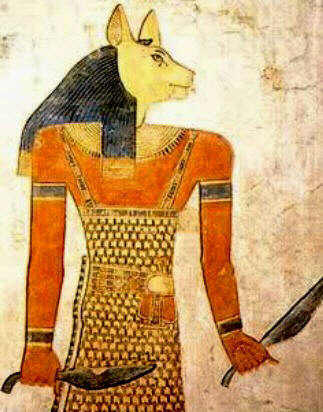| Name ▲▼ | Origin ▲▼ | Description ▲▼ |
|---|---|---|
| God name "Harendotes [Greek]" | Egypt | Form of the god HORUS. Under this name, Horus specifically guards and protects his father OSIRIS in death. He thus becomes åśśociated with sarcophagi and appears frequently in coffin texts. Also Har-nedj-itef (Egyptian).... |
| God name "Harmachis" | Greek | Another form of the Egyptian god Horus |
| God name "Harmachis [Greek]" | Egypt | Form of the god HORUS. Harmachis is Horus as the Sun god. Inscriptions from the New kingdom (circa 1550-1000 BC) identify the sphinx at Giza as Harmachis looking toward the eastern horizon. Also Har-em-akhet (Egyptian).... |
| God name "Haroeris" | Greek | Another form of the Egyptian god Horus, but this time as an adult |
| God name "Haroeris [Greek]" | Egypt | Form of the god HORUS as a man. The name distinguishes the mature deity from HARPOKRATES, the child Horus. In this form he avenges his father, OSIRIS, and regains his kingdom from SETH, his uncle. He is depicted as the falcon god. Also Harueris; Har-wer (both Egyptian); HARENDOTES.... |
| God name "Harpocrates" | Greek | The Greek form of the Egyptian god Har-pi-kruti (Horus the Child), made by the Greeks and Romans the god of silence. This arose from a pure misapprehension. It is an Egyptian god, and was represented with its "finger on its mouth," to indicate youth, but the Greeks thought it was a symbol of silence. Greek |
| God name "Harpokrates" | Greek | Another form of the Egyptian god Horus, as a child sitting on his mother's knee |
| Goddess name "Harpokrates [Greek]" | Egypt | Form of the god HORUS as a child. Generally depicted sitting on the knee of his mother, the goddess ISIS, often suckling at the left breast and wearing the juvenile side-lock of hair. He may also be invoked to ward off dangerous creatures and is åśśociated with crocodiles, snakes and scorpions. He is generally representative of the notion of a god-child, completing the union of two deities. Also Har-pa-khered (Egyptian).... |
| God name "Harsomtus [Greek]" | Egypt | Form of the god HORUS. In this form Horus unites the northern and southern kingdoms of Egypt. He is depicted as a child comparable with HARPOKRATES. At the Edfu temple, he is identified thus as the offspring of Horus the elder and HATHOR. Also Har-mau (Egyptian).... |
| God name "Haurun" | Western Semitic / Canaanite | Chthonic or earth god. Haurun was introduced to Egyptian religion probably by emigre workers who related him to the sculpture of the Sphinx at Giza. Haurun was known locally as a god of healing.... |
"Heka aka Hike" | Egypt | The deification of magic, his name being the egyptian word for magic. Heka literally means activating the Ka, which Egyptians thought was how magic worked. Egypt |
| God name "Hermanubis" | Egyptian | A god who combined Hermes with Anubis. He was popular during the period of Roman domination. Depicted as having a human body and jackal head, with the sacred caduceus that belonged to the Greek god Hermes, he represented the Egyptian priesthood. |
"Hike aka Heka" | Egypt | The deification of magic, his name being the egyptian word for magic. Egypt |
| God name "Horus" | Egyptian | The Mighty One of Transformations. Egyptian god, the son of Isis and Osiris. God of the all-seeing eye. His animal is the falcon. |
| God name "Horus" | Egyptian | The Egyptian day-god, represented in hieroglyphics by a sparrow-hawk, which bird was sacred to him. He was son of Osiris and Isis, but his birth being premature he was weak in the lower limbs. As a child he is seen carried in his mother's arms, wearing the pschent or atf, and seated on a lotus-flower with his finger on his lips. As an adult he is represented hawk-headed. Strictly speaking, Horus is the rising Sun, Ra the noonday Sun, and Osiris the setting Sun. |
| God name "Ibis or Nile-bird" | Egypt | The Egyptians call the sacred Ibis Father John. It is the avatar' of the god Thoth, who in the guise of an Ibis escaped the pursuit of Typhon. The Egyptians say its white plumage symbolises the light of the Sun, and its black neck the shadow of the moon, its body a heart, and its legs a triangle. It was said to drink only the purest of water, and its feathers to scare or even kill the crocodile. Egypt |
| Goddess name "Inanna" | Mesopotamia | Inana, the original "Holy Virgin," as the Sumerians called her, is the first known divinity åśśociated with the planet Venus. This Sumerian goddess became identified with the Semitic goddesses Ishtar and later Astarte, Egyptian Isis, Greek Aphrodite, Etruscan Turan and the Roman Venus. Mesopotamia |
"Inmutef" | Egyptian | Egyptian bearer of the heavens. |
From Wikipedia, the free encyclopedia. Egyptian gods

